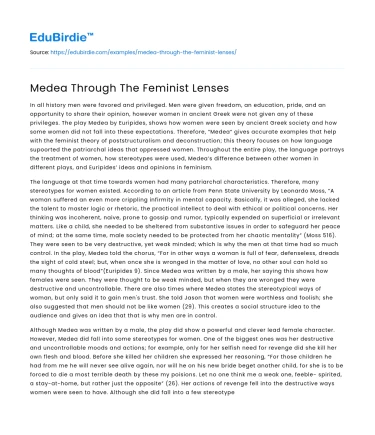In all history men were favored and privileged. Men were given freedom, an education, pride, and an opportunity to share their opinion, however women in ancient Greek were not given any of these privileges. The play Medea by Euripides, shows how women were seen by ancient Greek society and how some women did not fall into these expectations. Therefore, “Medea” gives accurate examples that help with the feminist theory of poststructuralism and deconstruction; this theory focuses on how language supoorted the patriarchal ideas that oppressed women. Throughout the entire play, the language portrays the treatment of women, how stereotypes were used, Medea’s difference between other women in different plays, and Euripides’ ideas and opinions in feminism.
The language at that time towards women had many patriarchal characteristics. Therefore, many stereotypes for women existed. According to an article from Penn State University by Leonardo Moss, “A woman suffered an even more crippling infirmity in mental capacity. Basically, it was alleged, she lacked the talent to master logic or rhetoric, the practical intellect to deal with ethical or political concerns. Her thinking was incoherent, naive, prone to gossip and rumor, typically expended on superficial or irrelevant matters. Like a child, she needed to be sheltered from substantive issues in order to safeguard her peace of mind; at the same time, male society needed to be protected from her chaotic mentality” (Moss 516). They were seen to be very destructive, yet weak minded; which is why the men at that time had so much control. In the play, Medea told the chorus, “For in other ways a woman is full of fear, defenseless, dreads the sight of cold steel; but, when once she is wronged in the matter of love, no other soul can hold so many thoughts of blood”(Euripides 9). Since Medea was written by a male, her saying this shows how females were seen. They were thought to be weak minded, but when they are wronged they were destructive and uncontrollable. There are also times where Medea states the stereotypical ways of woman, but only said it to gain men's trust. She told Jason that women were worthless and foolish; she also suggested that men should not be like women (29). This creates a social structure idea to the audience and gives an idea that that is why men are in control.
Save your time!
We can take care of your essay
- Proper editing and formatting
- Free revision, title page, and bibliography
- Flexible prices and money-back guarantee
Although Medea was written by a male, the play did show a powerful and clever lead female character. However, Medea did fall into some stereotypes for women. One of the biggest ones was her destructive and uncontrollable moods and actions; for example, only for her selfish need for revenge did she kill her own flesh and blood. Before she killed her children she expressed her reasoning, “For those children he had from me he will never see alive again, nor will he on his new bride beget another child, for she is to be forced to die a most terrible death by these my poisions. Let no one think me a weak one, feeble- spirited, a stay-at-home, but rather just the opposite” (26). Her actions of revenge fell into the destructive ways women were seen to have. Although she did fall into a few stereotypes, she mostly acted in very different ways than a “typical” women. One of the main reasons she did not fall into these stereotypes was her ability to use her words. Women at this time could not talk back to a man or voice their opinion, but Medea did the exact opposite of this. She was able to express her thoughts without any sugar coating, she expressed her freedom to share her opinion when she told Jason, “O coward in every way- that is what I call you, with bitterest reproach for your lack of manliness, you have come, you, my worst enemy have come to me! It is not an example of overconfidence or of boldness thus to look your friends in the face, friends you have injured- no, it is the worst of all human diseases, shamelessness” (15).
The author cleary gave her the ability to confidently voice her opinion; which is contradictory to most women's roles and abilities. Medea was also portrayed as a very clever woman. Since she was so clever, she was also feared and constantly questioned, but for justified reasons. When Creon exiled her from Corinth, he told her the reasoning was because of his fear of her cleverness. She responded with, “This is not the first time, Creon. Often previously through being considered clever I have suffered much. A person of snse ought never to have his children brought up to be more clever than the average. For, apart from cleverness bringing them no profit, it will make them objects of envy and ill-will. If you put new ideas before the eyes of fools they’ll think you foolish and worthless into the bargain; And if you thought superior to those who have some reputation for learning, you will become hated. I have some knowledge myself of how this happens; for being clever, I find that some will any me, other object to me” (10)






 Stuck on your essay?
Stuck on your essay?

